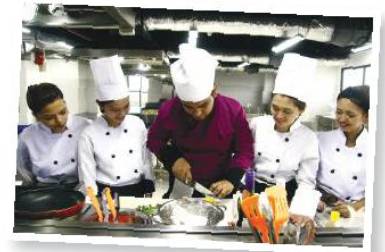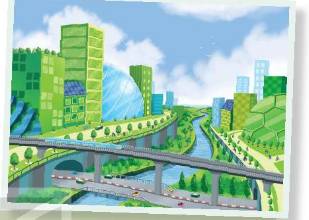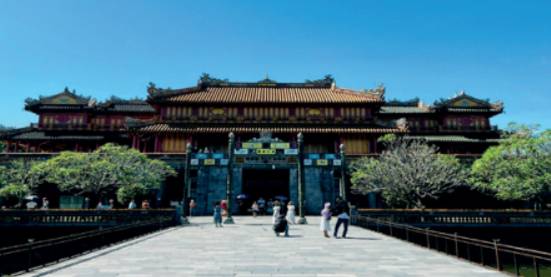Work in groups. Discuss the questions.
What kind of culture shock do you think foreigners may experience in Viet Nam?
What will you do to help them overcome it?
Work in groups. Discuss the following questions.
What farming activities in Viet Nam do you think have negative impact on the global temperature? What do you think are the alternatives to those activities?
Tham khảo:
There are several farming activities in Vietnam that can have a negative impact on the global temperature, including:
1. Rice cultivation: Rice cultivation is a major source of greenhouse gas emissions, primarily due to the production of methane during the decomposition of organic matter in flooded rice paddies.
2. Livestock production: Livestock production, particularly from cattle and buffalo, is a significant contributor to greenhouse gas emissions through the production of methane from enteric fermentation and manure management.
3. Pesticide use: Pesticide use in agriculture can lead to the emission of greenhouse gases, particularly nitrous oxide, as well as contribute to soil degradation.
4. Deforestation: Deforestation for agriculture, particularly for expanding rice paddies or livestock grazing areas, can contribute to the release of carbon dioxide into the atmosphere.
To address these negative impacts, some alternatives that can be considered include:
1. Sustainable rice cultivation: Alternative rice cultivation methods, such as aerobic rice cultivation or the use of alternate wetting and drying methods, can significantly reduce methane emissions from rice paddies.
2. Improved livestock management: Improved livestock management practices, such as better feeding and manure management, can reduce the emissions of methane and other greenhouse gases.
3. Organic farming: Organic farming practices, including the use of natural pest control methods and composting, can reduce the use of pesticides and fertilizers, as well as promote soil health.
4. Forest conservation and reforestation: Conservation and reforestation efforts can help to reduce the release of carbon dioxide from deforestation and promote carbon sequestration in new forest areas.
Overall, a shift towards sustainable agriculture practices and land use management can help to mitigate the negative impacts of farming activities on the global temperature.
Work in groups. Discuss the following questions.
Are the methods of preserving heritage in the text used in Viet Nam? Which one do you think works best in Viet Nam?
Vietnam has several methods of preserving heritage. One of the most common methods is through government funding. The government invests money in preserving heritage sites and objects, and it has been successful in many cases. Another way is through public-private partnerships, where companies provide funding for heritage preservation in exchange for advertising or other benefits.
Vietnam has also used UNESCO funding for the preservation of its cultural heritage. Additionally, the country has implemented strict heritage laws to protect its heritage sites and objects. For example, in 2016, Vietnam passed a law on cultural heritage, which regulates the protection, preservation, and promotion of the country's heritage.
As for which method works best in Vietnam, it depends on the specific context and situation. Each method has its advantages and disadvantages, and a combination of different methods may be the most effective way to preserve heritage in Vietnam.
Work in groups. Discuss the following questions.
Are there similar projects in Viet Nam? Do you think the ideas in 1 can be applied in Viet Nam?
There have been efforts in Vietnam to protect and restore ecosystems, such as the Green Annamites Project, which aims to protect the forest ecosystem and biodiversity in the Annamites mountain range. In addition, there are initiatives to restore mangrove forests in the Mekong Delta and protect coral reefs in Nha Trang Bay.
Regarding the applicability of the ideas in the text to Vietnam, it depends on the specific context and conditions in Vietnam. The Great Green Wall project, for example, is focused on restoring degraded land in Africa, which may not be directly applicable to Vietnam. However, the idea of ecosystem restoration and protection is relevant to any country, and the principles and strategies used in these projects could be adapted and applied to Vietnam's unique ecological challenges. For example, efforts to protect and restore marine ecosystems like the Belize Barrier Reef could be relevant to Vietnam's extensive coastal areas and rich marine biodiversity. Overall, it would require careful consideration and adaptation to make these ideas applicable to Vietnam.
Tạm dịch:
Việt Nam đã có những nỗ lực bảo vệ và phục hồi các hệ sinh thái, chẳng hạn như Dự án Trường Sơn Xanh nhằm bảo vệ hệ sinh thái rừng và đa dạng sinh học ở dãy Trường Sơn. Ngoài ra, còn có các sáng kiến khôi phục rừng ngập mặn ở ĐBSCL và bảo vệ rạn san hô ở vịnh Nha Trang.
Về khả năng áp dụng các ý trong văn bản vào Việt Nam thì tùy thuộc vào bối cảnh và điều kiện cụ thể ở Việt Nam. Ví dụ, dự án Bức tường xanh vĩ đại tập trung vào việc khôi phục đất bị suy thoái ở Châu Phi, điều này có thể không áp dụng trực tiếp cho Việt Nam. Tuy nhiên, ý tưởng phục hồi và bảo vệ hệ sinh thái phù hợp với bất kỳ quốc gia nào, và các nguyên tắc cũng như chiến lược được sử dụng trong các dự án này có thể được điều chỉnh và áp dụng cho các thách thức sinh thái đặc thù của Việt Nam. Ví dụ, những nỗ lực bảo vệ và phục hồi các hệ sinh thái biển như Rạn san hô Chắn bờ Belize có thể phù hợp với các vùng ven biển rộng lớn và đa dạng sinh học biển phong phú của Việt Nam. Nhìn chung, cần phải xem xét và điều chỉnh cẩn thận để những ý tưởng này có thể áp dụng cho Việt Nam.
Work in groups. Discuss the following questions.
Which of the characteristics of independent learners do you think you have? Which one do you want to develop in the future?
A list of characteristics of independent learners for discussion purposes:
Self-motivated: Independent learners are motivated by their own interests and goals, not just external rewards or pressures.
Self-directed: They take responsibility for their own learning and actively seek out resources and opportunities to improve their knowledge and skills.
Self-aware: They understand their own strengths and weaknesses, learning style, and preferences, and use that knowledge to guide their learning process.
Goal-oriented: They set clear and specific learning goals and regularly assess their progress toward achieving them.
Persistent: They persevere through challenges and setbacks and keep working toward their goals.
Reflective: They regularly reflect on their learning experiences and use that feedback to improve their learning strategies.
Resourceful: They know how to find and use a variety of learning resources, including books, online courses, mentors, and peers.
Curious: They have a strong desire to learn and explore new ideas and topics.
Creative: They think outside the box and find innovative ways to solve problems and achieve their goals.
Collaborative: They work well with others and are open to learning from different perspectives and experiences.
Work in pairs. Look at the picture and discuss the following questions.
1. What kind of vocational course are they taking?
2. Do you think students need any special qualifications to apply for this course?
3. What do you think students expect to learn from this course?

1. Based on the context of the picture, it seems like the students are taking a vocational course in cooking or culinary arts.
2. It's possible that students may need certain qualifications or prerequisites to apply for this course, such as a high school diploma or previous experience in cooking. However, it ultimately depends on the specific requirements of the course and the institution offering it.
3. Students in this course likely expect to learn various cooking techniques and recipes, as well as gain a deeper understanding of the culinary arts. They may also learn about food safety, kitchen hygiene, and restaurant management if the course covers those topics. Additionally, students may hope to gain hands-on experience in cooking and receive feedback on their dishes from their instructor. Overall, the goal of this course is likely to help students develop their skills and knowledge in the culinary field.
Work in groups. Discuss the questions.
1. What will future cities look like?
2. Do you think they will be ‘smarter’ and more sustainable? Why/Why not?

1.
Future cities are likely to be more technologically advanced and densely populated than they are today.
(Các thành phố trong tương lai có thể sẽ có công nghệ tiên tiến hơn và đông dân cư hơn so với hiện nay.)
They may also be more sustainable, with green spaces and renewable energy sources.
(Chúng cũng có thể bền vững hơn, với không gian xanh và các nguồn năng lượng có thể tái tạo.)
There may be a greater focus on public transportation and walkability, rather than car-centric design.
(Có thể có sự tập trung nhiều hơn vào giao thông công cộng và khả năng đi bộ hơn là thiết kế tập trung vào ô tô.)
2.
Yes, I think future cities will be smarter and more sustainable.
(Vâng, tôi nghĩ các thành phố trong tương lai sẽ thông minh hơn và bền vững hơn.)
Technology will play a key role in optimizing resource usage, reducing waste, and improving efficiency.
(Công nghệ sẽ đóng một vai trò quan trọng trong việc tối ưu hóa việc sử dụng tài nguyên, giảm lãng phí và nâng cao hiệu quả.)
There is also a growing awareness of the need to reduce our impact on the environment, and sustainability will be a key consideration in urban planning and development.
(Ngoài ra còn có nhận thức ngày càng tăng về nhu cầu giảm tác động của chúng ta đối với môi trường và tính bền vững sẽ là yếu tố chính được xem xét trong quy hoạch và phát triển đô thị.)
Work in groups. Discuss the following questions
1. What social media do you use?
2. How often do you use it?
3. What do you use the social media for?
Report your group’s results to the class.
Tham khảo
1. I'm using Facebook; Instagram; Twitter; ...But I love using Instagram the most.
2. I use it every day, about 3 - 5 hours per day.
3. I use Instagram to check my notifications and upload stories or photos.
1. I'm using Facebook; Instagram; Zalo, Lotus; ...
2. I use it every day, about 2 - 4 hours per day.
3. I use Facebook to check my notifications and upload stories or photos.
SPEAKING Work in pairs. Discuss the questions.
1. Have you ever visited any castles or palaces in Viet Nam? Which are the most famous ones? Why?
2. Do you recognise the palace in the photo? What do you know about it?

1. I haven’ visited any castles or palaces in VietNam before. However, I know some of the most famous ones such as Hue Imperial Citadel, the Thang Long Imperial Citadel, and the Ho Dynasty Citadel. These historical sites are significant because they showcase the country's rich history and cultural heritage.
(Tôi chưa từng đến thăm bất kỳ lâu đài hay cung điện nào ở Việt Nam trước đây. Tuy nhiên, tôi biết một số địa điểm nổi tiếng nhất như Cố đô Huế, Hoàng thành Thăng Long và Thành nhà Hồ. Những di tích lịch sử này rất có ý nghĩa vì chúng thể hiện di sản văn hóa và lịch sử phong phú của đất nước.)
2. I haven’t seen this palace before, but I guess it is the Hue Imperial Citadel.
(Tôi chưa nhìn thấy cung điện này bao giờ, nhưng tôi đoán đó là Hoàng thành Huế.)
Work in groups. What skills do you think you will gain while studying abroad? Report your group’s answer to the class.
Tham khảo:
Skills studying abroad will give you
1. Intercultural communication and language
While you’re studying abroad, you will gain intercultural communication skills from interacting with people from different cultures.
2. Cultural awareness
Cultural awareness is a skill achieved from studying abroad when you really make an effort to understand the new country and its culture that you’re living in. Being culturally sensitive is a crucial part to being able to adapt to, or being flexible with, foreign surroundings.
3. Self-awareness
A more heightened self-awareness can be triggered while studying abroad as you begin to settle into your new home. When you find yourself in situations that are unfamiliar to you, you become more vulnerable. This vulnerability forces you to assess who you are and will maybe even make it more clear who or what you want to be.
4. Adaptability
Learning the local language, trying cultural dishes, understanding laws, customs, learning how to use money and how to use different transportation systems, are just a few things you’ll have to learn and to which you’ll have to adapt.
5. Empathy
Visiting historical sites, walking along ancient roads, and (most importantly) talking and connecting with people of different cultures all teach you empathy. When you get to interact with others and hear their stories, you will find that humans share much more in common than you thought—even if you grew up on literal opposite sides of the world.
6. Confidence
Your confidence can come from a lot of things, but it all comes down to challenging yourself and learning new things while abroad. Something as simple as learning to navigate the local transportation system, or how to order food in another language will make you more confident in yourself and your capability.
7. Problem solving and a sense of responsibility
Maybe you got lost walking to class or had a set back trying to learn the local transportation system. You will be responsible for thinking out of the box through these challenges, and oftentimes on your own. Being responsible for managing things on your own is an important skill you’ll gain (and practice) from studying abroad.
8. Independence
Living abroad in a different country with unfamiliar cultural norms can be daunting. But, you will learn how to be independent by facing and working through challenges (and life) on your own, and you’ll become more comfortable with your potential.
9. Maturity
The more you experience, learn, and grow throughout life (and accept the fact that it’s necessary), the more mature you will become. All of the skills learned from studying abroad can be used together in any combination to show you’re mature.
When returning home from studying abroad, you may feel different, changed. You may even learn more about yourself and see your own culture and home in a different light. Plus, the experiences and skills gained from study abroad can be used to your advantage in terms of your future career.
Talking about a place of interest in your hometown.
1. What is the craft village in Viet Nam you would like to visit?
2. What is it famous for?
3. What can you do there?
4. What do you think the government should do to improve the craft villages?